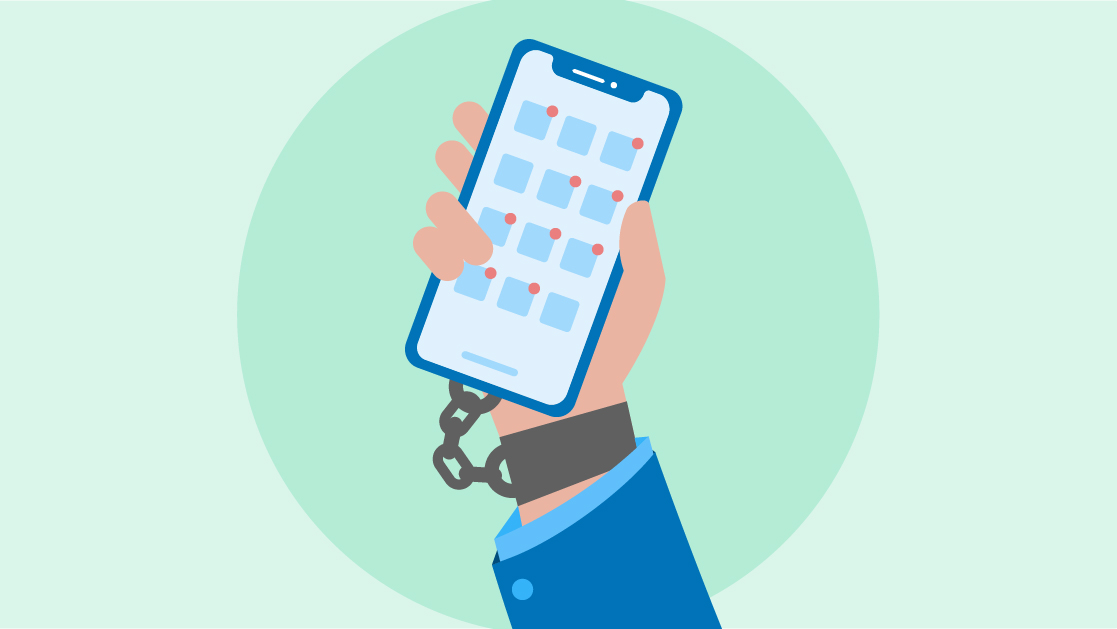Mobile Dependency: What It Is and Its Impact
What is mobile dependency, and how does it relate to smartphone addiction? Read on for symptoms, treatment options, and more.

What is mobile dependency, and how does it relate to smartphone addiction? Read on for symptoms, treatment options, and more.

If you, like 85% of Americans, own a smartphone, there’s a good chance you keep it nearby at all times.
Now imagine for a second that your phone disappears. You can’t find it anywhere, even with the help of a desktop phone finding app.
Hours go by, and still no phone. How are you feeling?
If you’re feeling anxious, you’re not alone.
This anxious or fearful feeling is sometimes called nomophobia (think “no mobile phone phobia”). The term was coined in a 2008 YouGov study, which found that 53% of mobile phone users experienced fear and anxiety without their devices.
Then, in 2012, another study found that 66% of mobile phone users experience nomophobia, suggesting the problem has gotten worse.
In 2020, we surveyed 1,000 smartphone owners about what people would sacrifice to keep their smartphone, and we were shocked to learn that 44% of respondents would rather serve five days of jury duty than be separated from their phones for five days.
Mobile dependency, also known as smartphone addiction or compulsive smartphone use in some studies, occurs when someone compulsively uses their cell phone despite problems stemming from that use.
You could argue that everyone, to an extent, is dependent on their phones in some way because of how hyper-connected everything is. Smartphones can be used for everything from banking and sending emails to taking photos and watching movies.
But at what point does it become a problem?
Mobile dependency symptoms could include:
Essentially, you could have cell phone addiction if your phone use interferes with your quality of life.
Mobile dependency can affect anyone, regardless of age or other demographic information, but it seems to affect young people the most.
A 2021 study found that while 38.9% of 18 to 30-year-old participants showed signs of smartphone addiction, the rate climbed to 42.2% for those under 21.
When researchers ask people if they feel addicted to their phones, the rates can go even higher. Reviews.org’s 2021 cell phone addiction study found that 47% of respondents believe they’re addicted to their phones.
If you suspect you or a loved one has an addiction to their smartphone, there are several treatment options you can discuss with your healthcare provider:
Don’t have a healthcare provider yet? You can search for a therapist near you on Psychology Today.
Used in moderation, a smartphone can help you feel more connected to people and informed about the world. But if you feel like your usage may be out of control, don’t be afraid to take the first step toward recovery.
Dani Henion is the content team lead at SimpleTexting and is continuously looking for ways to make text messaging strategies and tips more accessible to SMBs. When she's not writing or planning new SMS content, you'll find her decorating elaborate sugar cookies or thrifting in Atlanta.
More Posts from Dani HenionSMS is one of the most effective ways for franchise systems to communicate. Here are five ideas to help you get started.
ReadIf COVID-19 has taught organizations anything, it’s that they need a business continuity plan. Here’s the role SMS can play.
ReadStart a text marketing campaign or have a 1-on-1 conversation today. It's risk free. Sign up for a free 14-day trial today to see SimpleTexting in action.
No credit card required